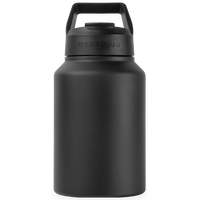
Thirst vs. Hunger: How to Decode Your Body's Signals
Have you ever found yourself reaching for a snack, thinking you're hungry, only to realize that you were actually thirsty? It's a common scenario, and it highlights the importance of understanding the signals your body sends when it needs nourishment or hydration. By learning to differentiate between thirst and hunger, you can make healthier choices and better meet your body's needs.
The Science Behind Thirst and Hunger:
To understand the distinction between thirst and hunger, first we need to explore why our bodies feel hungry and thirsty:
-
Thirst: Thirst is regulated by the hypothalamus, a region in your brain responsible for maintaining homeostasis (stability) in the body. When the concentration of salts and other solutes in your blood rises, or when your blood volume decreases, your hypothalamus triggers the sensation of thirst to get you to drink fluids.
-
Hunger: Hunger, on the other hand, is controlled by a complex group of hormones, including ghrelin (the hunger hormone) and leptin (the 'full' hormone). These hormones communicate with your brain to signal when you need to eat based on factors like your blood sugar levels and energy expenditure.

Decoding Thirst vs. Hunger:
-
Drink Water First: When you feel hungry, start by drinking a glass of water. Sometimes, your body confuses thirst with hunger. Wait for a few minutes, and if your hunger persists, then it's likely genuine hunger.
-
Check the Clock: If you've recently eaten a meal or snack and you're feeling hungry again shortly afterward, it may be thirst. True hunger usually takes a couple of hours to develop after a meal.
-
Analyze the Craving: When you're hungry, you might crave specific foods, especially those high in carbohydrates or fats. If you're genuinely hungry, these cravings are more likely to be present.
-
Listen to Your Body: Pay attention to physical cues. True hunger often comes with physical sensations like stomach growling, while thirst may manifest as a dry mouth or feeling parched.
-
Consider Your Recent Activities: If you've been physically active or exposed to hot weather, your body may require more fluids. In such cases, thirst is more likely.
-
Mindful Eating: Practice mindful eating by savoring each bite and paying attention to your body's cues. This can help you differentiate between emotional or boredom-related eating and genuine hunger.
-
Keep a Food and Drink Journal: Tracking your food and beverage intake can help you identify patterns in your eating habits and recognize whether you tend to confuse thirst with hunger.
Understanding the difference between thirst and hunger is a valuable skill that can support your overall well-being. By tuning in to your body's signals, drinking water regularly, and being mindful of your eating habits, you can make healthier choices and ensure that you're addressing your body's true needs. Remember, staying properly hydrated is essential for good health, so don't underestimate the power of a glass of water when you're trying to decipher those internal messages from your body.


























